As a beginner content creator, I’m sure you’ve come across this term SEO countless times. So much so that it’s made to appear a prerequisite academic training for aspiring bloggers. No exactly so!
SEO – short for Search Engine Optimization is the practice of improving a website’s visibility and ranking in search engines results pages (SERPs).
To avoid confusing you with new terms, let me explain;
- Search engines – these are software systems designed to search and retrieve information from the Internet. They are the engines behind the search results we receive back whenever we undertake a search in the Internet. Top search engines include Google, Yahoo, Bing among others.
- Search engine result pages (SERPs) – whenever you type a query or a search phrase in Google or any other search engine, you receive back a listing of responses. This is what is known as SERPs
Type of Online Search Results Listings
What has SEO got to do with online searches?
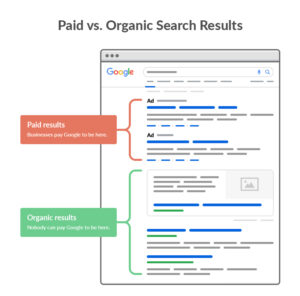
Whenever you do a search on Google, you will receive two types of listings; sponsored links and organic search listings.
For sponsored links (usually at the top of the search results page), advertisers pay to get listed. These paid-up ads often match customers interests with the appropriate advertising messages. You will often see the word ‘sponsored’ besides the listing.
Organic search however relies on the search engine algorithm for visibility. In other words, SEO helps you attract free traffic (organic traffic).

Fundamentals of SEO for Beginners
To get get started with SEO, you must digest the following key concepts so that you can inchoate them in your content;
#1. Keyword Research
As a blogger, you must first identify keywords and phrases that your target audience are likely to use when searching for information related to your content. Keyword research tools will help you to find relevant keywords with a good balance of search volume and competition.
Remember to have correct understanding of the search-intent of your target audience.
#2. On-Page Optimization
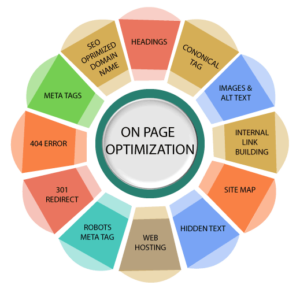
On-page optimization (also known as on-page SEO) refers to all measures that can be taken directly within the website in order to improve its position in the search rankings. The idea is to optimize individual pages for specific keywords with relevant, informative, and well-structured content for the search engines and the users.
The following aspects of the webpages optimised as follows:
- Title Tags – Craft descriptive and compelling title tags for each page, including relevant keywords.
- Meta Descriptions – Write concise and informative meta descriptions that encourage users to click.
- Header Tags – Use H1, H2, and H3 tags to structure your content logically.
- URL Structure – Create clean and readable URLs, incorporating keywords if possible.
#3. Quality Content
Quality content is the king, SEO notwithstanding.
Its therefore imperative that every blogger must create high-quality, original, and engaging content that provides value to your audience. This not only helps with SEO but also improves the SEO KPIs such as visitors staying longer in your pages and reducing bounce rates.
#4. Link Building
Backlinks are links from other websites pointing to your site.
Backlinks are crucial for SEO as they signal to search engines that other sites consider your content credible, potentially boosting its search ranking.
Focus on acquiring natural and authoritative backlinks through content promotion, guest blogging, influencer outreach, and social media marketing.
#5. Technical SEO
Technical SEO focuses on making a website faster, easier to crawl, and more understandable for search engines. It’s all about endearing the web pages to the search engines for improved ranking.
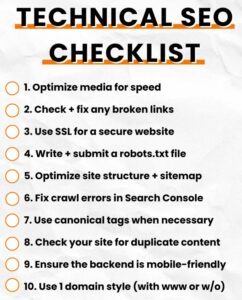
You must therefore have a well structured website, fast loading speed, mobile-friendliness, secure HTTPS protocol, and proper XML sitemap and robots.txt file setup.
#6. User Experience (UX)
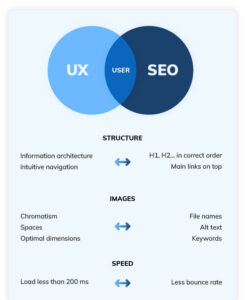
User Experience (UX) is a critical element in the success of any online business. It encompasses a user’s interaction with a website, application, or any digital product and focuses on creating a positive, efficient, and enjoyable experience.
User experience targets customer satisfaction aspects of the audience; ease of navigation, fast loading pages, reduce bouncing rates, increased conversion rates, brand royalty among others.
Putting substantial effort in providing a positive user experience on your website for better user engagement and indirectly impact your SEO.
User experience is one of the pillars of the so called Google Core Vitals, a set of metrics indicating the level of interaction by the users of your web pages.
#7. Monitoring and Analysis
Ir always important to monitor your website’s performance regularly using analytics tools like Google Analytics.
When you track your SEO efforts (keyword rankings, traffic sources, visitors’ behaviours, conversions etc), you identify areas for improvement and adjust your strategies accordingly.
Why SEO Matters: The Impact of Organic Traffic on Your Website
As of January 2021, there were over 4.66 billion active Internet users, close to 60% of the global population (www.statista.com). Obviously, such a huge number of potential customers creates a stiff competition. The big question then is; how do i stay ahead of the competition by being the most appealing to these visitors?
The website that draws the most traffic stands the better chance of transforming the traffic into business. SEO underlying focus is to drive organic traffic to your website.

Your website will only become a trusted and preferred information source, if visitors consistently find answers to their problems. SEO ensures that your website contains not only relevant but high-intent content for organic visibility. This will in turn lead to traffic, leads, sales and ultimately profit for your business.
The use of search engines to build and sustain brand is the backbone of Search Engines Marketing (SEM). Application of SEO enables online businesses to monetize the value of the search process. The better optimized a page is (using SEO), the higher a ranking it will achieve in search engine result listings.
What are the Advantages of SEO to Businesses?
SEO helps businesses in a myriad of ways including;
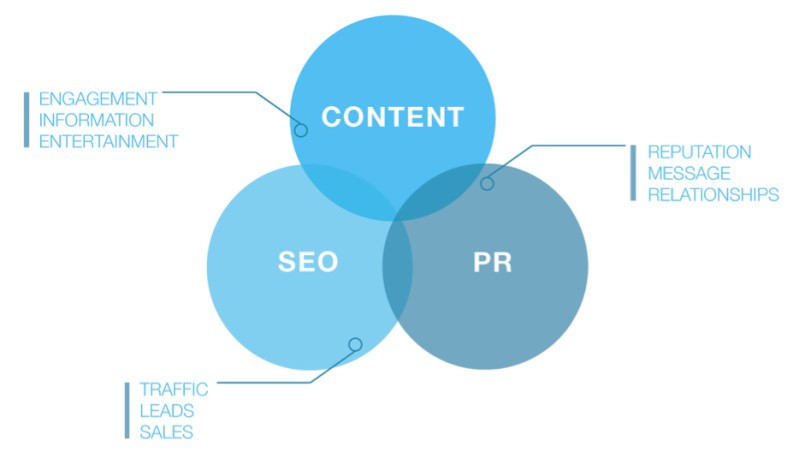
- Enhance Organic Search Results Listing – SEO is a customer-centric and targeted process outside the paid-up advertising. As a result, a website stands to gain immensely from organic discovery and visibility from matched intentions and interests of the customer. An effective SEO strategy will greatly help in delivering relevant web pages to relevant audience through pertinent search queries
- Increased Web Traffic– SEO ensures your website is offering what visitors are looking for by enabling organic visibility. It drives high-quality traffic to your website with minimum effort of enticing the visitors.
- Good ROI (Return on Investment) – The end result of any marketing effort is revenue generation. Google’s organic rankings for example, are based entirely on what its algorithm determines to be the best results for any given query. This means that once you’ve created a page that the search engine deems worthy of directing their users to, it can continue to attract traffic to your site for months (or even years) after you publish it.
- SEO is long-term Marketing Strategy– Although the impact of SEO in business usually immediate, over time this will be compounded stretching long after initial efforts.
- Brand Credibility and Trust– Google for example will rank web pages based on created content, website speed, and mobile usability. While most online visitors will not take into account such factors, they trust search engines such as Google for relevant and valuable content. A highly ranked search result implicitly translates into persistent patronage by visitors.
Search Engines Ranking & SEO
Understanding how search engine works is an integral part of SEO. Better understanding will lead to better SEO strategies. It is also important to understand how search engines work so that you are to focus on value addition areas.
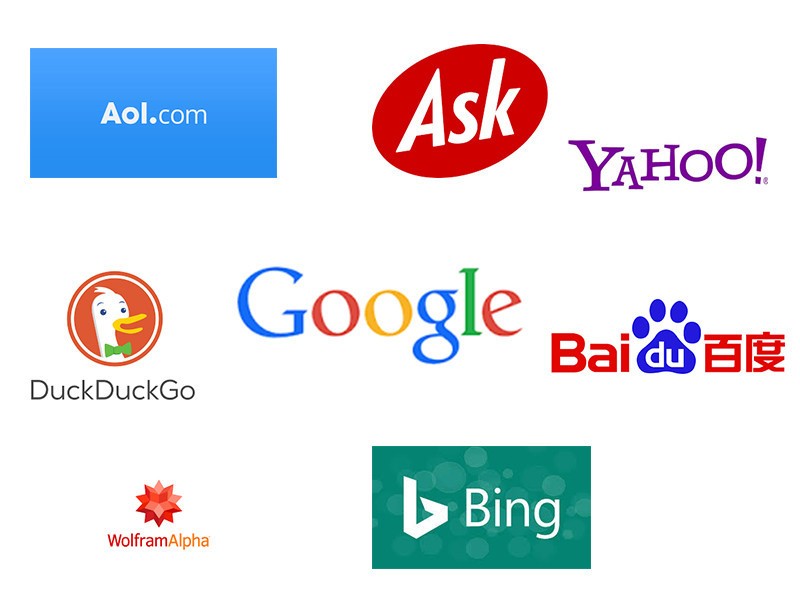
Search engines can be compared to digital libraries. In place of volumes of books, journals and other reference materials, the search engines have index for billions of web pages. Upon typing a search phrase in a search engine, it looks through all the pages in its database and tries to return the most relevant results.
While different search engines may use different techniques in their functioning, the underlying principles is hinged on the following;
- Crawling – use of small programs called web crawlers use links of known websites to discover new websites, scan the new websites and pass its content for indexing.
- Indexing – authenticate and store the website contents into the search engine libraries (database)
- Ranking – scoring the index content based on set parameters.
To accomplish this, the search engine use an algorithm, a computer code that rank web pages based on predefined criteria. It’s this code that SEO always attempt to align your content with.
Google.com for example https://www.google.com/intl/en_uk/search/howsearchworks/algorithms/ has this to say about its search algorithms;
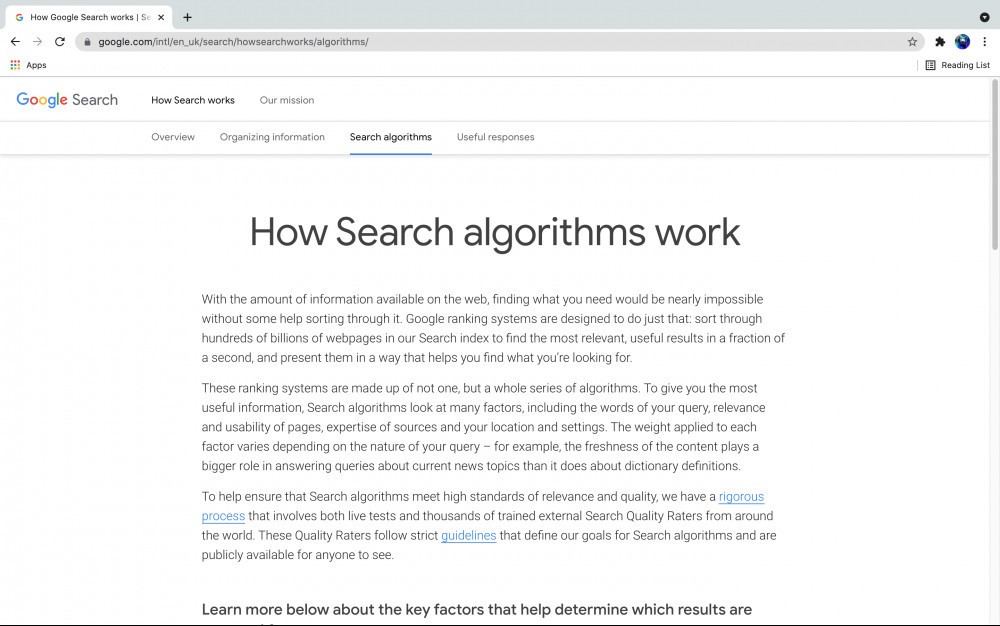
7 Ways to Create Content for Optimised SEO Ranking
Its not in contention that SEO drives traffic to online business. If you focus on high-quality content, you can optimize your webpages to turn up higher in search engine results. After all, majority of visitors to your website tend to only look at the first few lines of the SERP. You cannot therefore avoid SEO in your online marketing strategies.
The big question then is how to improve your SEO especially from nontechnical perspective. Here are some tips on improving your SEO efforts.
Keywords Research
The pivotal role of Keyword Research in SEO strategy cannot be understated. You must ensure that your content is created using both primary and secondary keywords. While the focus should be on primary keywords especially for landing pages, the secondary keywords play a big role in providing more details that are not contained in the primary keywords.
How do you perfect the use of keywords? Use keyword research Tools such as Jaaxy Keyword Research Tool. You will be able to generate different combinations of keywords before subjecting them to competition.
URLs
The structure of your URLs can improve SEO rankings particularly the on-page SEO. A good URL be short and descriptive. You can improve the value of your URLs by;
- Use of keywords – Your URL should include one or more of target keywords.
- Easy to understand – It serves as a guide to readers to know what the webpage is about.
- Be concise – Majority of search engines don’t process too long longer URLs.
Backlinks
Backlinking is when other websites link to your webpages as a source of information. The message relayed by backlinks is that your website is an authority on a particular topic thereby enhancing your ranking. Backlinks are a critical ranking factor and therefore you should strive to receive them from authoritative sources.
Some of the methods to build links to your website include;
- Become a guest writer for other websites especially in your niche.
- Contributing in professional associations in your niche.
Featured Snippets
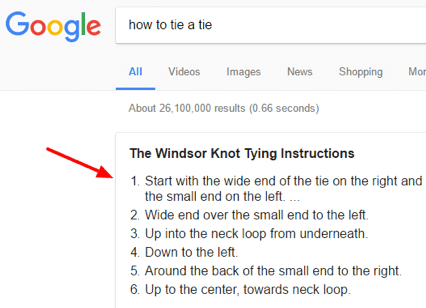
Featured Snippets are short snippets of text that appear at the top of Google’s search results in order to quickly answer a searcher’s query. You should therefore strive at all costs to rank in featured snippets. As a result, Google’s Featured Snippets is a extremely lucrative spot that all online marketers fight to occupy when it comes to SERPs.
Featured Snippets impact SEO in at least two broad ways;
- It is an opportunity to get more clicks from the organic search results, without higher Google rankings.
- Featured Snippets increase the number of no-click searches (when a searcher doesn’t click on any of the search results). This is so because the Featured Snippet often gives someone the answer they’re looking for.
Content Format
You content must be aligned to the search engines algorithm at all times. It’s the only way to gain favor with search engines. Write a clear, factual and properly structured content so that it can be SEO-friendly.
Page Titles and Meta Descriptions
Besides the keywords, page titles and meta descriptions impact greatly the value of the content you write. Always have it in your mind that these two aspects of your content matter in search results. A Google user might decide whether to click on your page based only on these short sections.
Word Count
It is important that the search engines fully understand the content you present for ranking. Ensure therefore you write reasonable content that is comprehensive enough for the searchers and also for the search engine to fully understands it. Too short articles may be ranked lower by Google.
Originality
One of the parameter search engines use is originality of the content. Plagiarized content not only denies you good ranking but also lowers your authority in that topic. Original content is a gem in Google ranking.

Conclusion
SEO target is to demonstrate to search engines that your content is the best result for the search at hand. Its also responsible for driving traffic to websites and therefore the foundation of monetizing websites or blogs.
Since the bulk of online searches happen on the Google search engine, it is imperative that every SEO effort understands and cater for Google’s algorithm. If you want more video views for example, then you have to target the YouTube’s algorithm.
Remember, SEO is an ongoing process, and it takes time to see results. It’s essential to stay up-to-date with industry trends and search engine algorithm updates to adapt your SEO strategies accordingly.
Jeff
Safari Affiliate
